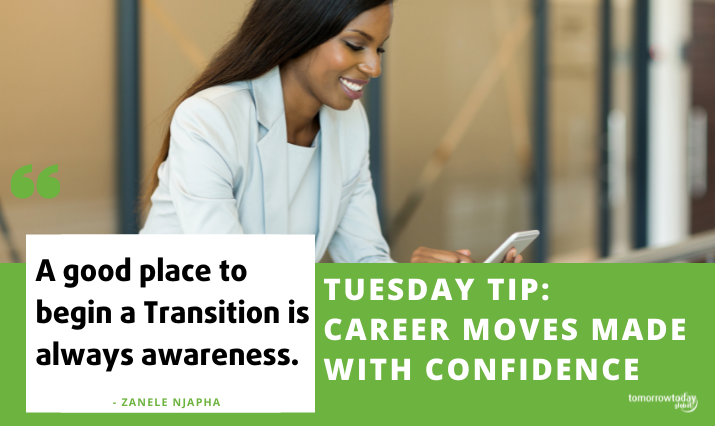Please be honest…
Were you one of those people who said 2021 was the year for your Career Move? Or did you find this happening, without it being something you had intended?
According to the US Bureau of Labour Statistics (2019), the average professional occupies an average of 12 different careers in their lifetime! This data indicates that we spend a lot more time ‘transitioning’ between phases or careers than we realise.
Either way, I’d love to know how those Career Transitions are going for you. Which ones am I referring to, you ask? Here are a few examples:
- Changing functions, roles or teams
- Taking on a position of leadership
- Moving/changing organisations
- Starting a ‘side-hustle’
- Leaving full-time employment to run your own business
- Retirement or planning for retirement
Quite often these exciting Career Transitions come with immense uncertainty and we somehow find ourselves looking back at what ‘once was’ or we become too paralysed with fear, that we neglect to make the move at all.
Trust me, as someone who has been there – I know the feeling.
So, to help you Confidently make your Career Move regardless of that gnawing pang of uncertainty, I’d love to help you understand the 3 stages of any Career Journey, and what the two key questions to ask at each stage are.
Career Endings
Is this you?
- You feel you are no longer growing, or you feel you are contacting (shrinking, moving backwards)
- You feel stuck, or as if you’re going in circles
- You have a deep desire for something ‘more’
Questions to ask:
- Are there opportunities for growth I’m not aware of?
- What emotions am I experiencing & how might I manage them?
New Beginnings
Is this you?
- You’re the ‘baby’ in the team – many are offering you voluntary support
- You’re learning something new at every turn and finding your feet
- You are looking forward to routine & stability
Questions to ask:
- How will I measure my progress or success in this new opportunity?
- Who can I connect with to support me (mentor, sponsor or coach)?
Settled & Kicking Ass (yes, I said it)
Is this you?
- Newcomers ask you for guidance & tips
- The team understands your work style & capacity
- You have a hidden desire for growth & being challenged that your current opportunity seems to be giving you less and less of
Questions to ask:
- Am I falling for the alluring ‘sage stage’ (being the all-knowing ‘sage’ in the workplace)?
- How can I recalibrate & realign to my Career Development plan and my purpose?
A good place to begin a Transition is always awareness, so use the above to identify where you currently are and what you may need to keep your eyes on.
Would you like a deep dive of the above? To clarify the concepts and guide you as you move along?
Good news:
I recently ran a 2-hour workshop, that’s now available as an online course, broken up into a few highly valuable modules and covering all of the above and so much more.
Here’s what Lin Kayton said about it: “I wish I had done this before I changed my last two jobs…. you just don’t think about it until you’re on the other side.“
More good news:
If you enroll this week, you get immediate access to the following exciting bonuses…
- Free Access to exclusive, by-invite-only, UnLearning Tribe networking session on the 27th of May.
- 30-minute one-on-one coaching session to help future-proof your Career vision against disruption. Available from the 24th of May until the 21st of June 2021.
- Video content: 3 BIGGEST mistakes to avoid when Transitioning that can set you back YEARS of progress.
- ‘Hack Your Transition’ cheat sheet (practical tools & strategies to help you navigate your transition like a PRO)
My thoughts – If we are going to Transition an average of 10 times, it helps to be strategic about what to look out for and what questions to ask, so we can Transition with Confidence!
About the author of today’s Tuesday Tip – Zanele Njapha
In the face of disruptive change, Zanele, author of today’s Tuesday Tip, assists organizations to become future fit: adaptable, resilient, innovative, proactive and confident through helping them crack the unlearning code.
She does this by facilitating the understanding that learning, unlearning and relearning must be the crux and heart of an organisation’s DNA if they are serious about being future-fit.



Trackbacks/Pingbacks